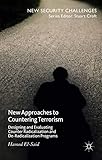New Approaches to Countering Terrorism : designing and evaluating counter radicalization and de-radicalization programs / Hamed El-Said.
Material type: TextSeries: New security challenges seriesPublisher: New York, NY : Palgrave Macmillan 2015Description: vi, 302 pages : illustrations ; 22 cmContent type:
TextSeries: New security challenges seriesPublisher: New York, NY : Palgrave Macmillan 2015Description: vi, 302 pages : illustrations ; 22 cmContent type: - text
- unmediated
- volume
- 9781137449962
- 1137449969
- 9781137480026 (pbk.)
- 1137480025 (pbk.)
- Designing and evaluating counter radicalization and de-radicalization programs
- 363.32517 23 SAI-N 400
- HV6431 .E477 2015
| Item type | Current library | Collection | Call number | Status | Barcode | |
|---|---|---|---|---|---|---|
 Books
Books
|
PIPS Library | NFIC | 363.32517 SAI-N 400 (Browse shelf(Opens below)) | Available | 400 |
Includes bibliograhical references (pages 280-294) and index.
1. Introduction -- 2. Counter De-Rad: Setting the Framework -- 3. Radicalization in a Western Context: The Case of Australia -- 4. Counter Radicalization and Deradicalization in a Western Context: The Case of Australia -- 5. Mauritania: From Toleration to Violent Islam -- 6. Singapore: Crisis of Identity, Shared Values and Religious Rehabilitation -- 7. Sudan: Deradicalization and Counter Radicalization in a Radicalizing Environment -- 8. From Militarization to Democratization: The Transformation of Turkey's Counter Terrorism Strategy -- 9. Conclusion and Some Remarks.
Hamed El-Said investigates the emergence of new, 'soft' approaches to counter violent extremists, generally known as counter radicalization and deradicalization programmes (Counter-de-Rad). This is the first work to develop a holistic framework which will allow policy makers and practitioners to better understand conditions conducive to violent extremism, and to better design and effectively implement such programmes in the future. This book, supported and facilitated by a wealth of primary research and consideration of all stakeholders, addresses cultural and legal differences between countries while developing its holistic approach. In addition, the research focuses on and identifies conditions conducive to either the success or the failure of Counter-de-Rad programmes. Finally, it provides a new, broader approach to evaluate the performance of such programmes, one that goes beyond the current narrow models which treat recidivism rates as the main indicator of success or failure.
There are no comments on this title.
